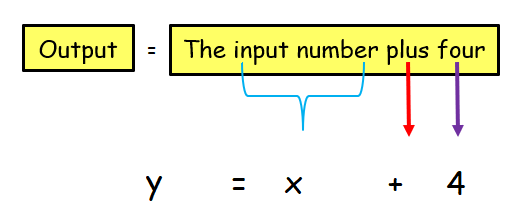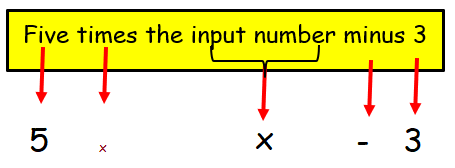FIND INPUT NUMBER FROM THE RULE AND OUTPUT
Subscribe to our ▶️ YouTube channel 🔴 for the latest videos, updates, and tips.
From the given rule and output to find the sequence, we have to follow the steps given below.
(1) Assume x as input and y as output
(2) Based on the rule given find the function
(3) Apply the given input or output values in the function and find the other one.
Given the following output numbers and rules, calculate the corresponding input numbers :
Example 1 :
Rule : the input number plus four
Output numbers {5, 7, 15}
Solution :
Let x and y be the input and output number respectively.

|
y = 5 5 = x+4 x = 5-4 x = 1 1 ==> 5 |
y = 7 7 = x+4 x = 7-4 x = 3 1 ==> 3 |
y = 15 15 = x + 4 15 – 4 = x x = 11 11 ==> 15 |
So, the required function is y = x+4
So, input numbers and output numbers are
1 ==> 5, 3 ==> 7, 11 ==> 15
Example 2 :
Double the input number plus two
Output numbers {2, 4, 10}
Solution :
Let x and y be input and output respectively.

So, the required function is y = 2x+2
|
y = 2 2 = 2x + 2 x = 0 0 ==> 2 |
y = 4 4 = 2x + 2 x = 1 1 ==> 4 |
y = 10 10 = 2x + 2 x = 4 4 ==> 10 |
So, input numbers and output numbers are
0 ==> 2, 1 ==> 4, 4 ==> 10
Example 3 :
Rule : Five times the input number minus three
Output numbers {7, 12, 17}
Solution :
Let x and y be input and output respectively.

So, the required function is y = 5x-3
|
y = 7 7 = 5x - 3 x = 2 7 ==> 2 |
y = 12 12 = 5x - 3 x = 3 3 ==> 12 |
y = 17 17 = 5x - 3 x = 4 4 ==> 17 |
So, input numbers and output numbers are
7 ==> 2, 3 ==> 12, 4 ==> 17
Example 4 :
Rule : Add one to the input number then double the result
Output numbers {2, 6, 12}
Solution :
Let x and y be input and output respectively.
Add one to the input number ==> x+1
double the result ==> 2(x+1)
|
y = 2 2 = 2x + 2 x = 0 0 ==> 2 |
y = 6 6 = 2x + 2 x = 2 2 ==> 6 |
y = 12 12 = 2x + 2 x = 5 5 ==> 12 |
So, input numbers and output numbers are
0 ==> 2, 2 ==> 6, 5 ==> 12
Example 5 :
Rule : Multiply the input number by itself then add one
Output numbers : {2, 5, 17}
Solution :
Let x and y be input and output respectively.
Multiply the input number by itself = x(x)
= x2
add one = x2 +1
|
y = 2 2 = x2 + 1 x2 = 1 x = ±1 ±1 ==> 2 |
y = 5 5 = x2 + 1 x2 = 4 x = ±2 ±2 ==> 5 |
y = 17 17 = x2 + 1 x2 = 16 x = ±4 ±4 ==> 17 |
Example 6 :
Rule : Multiply the input number by one more
than itself.
Output numbers {2, 6, 20}
Solution :
Let x and y be input and output respectively.
According to
given rule,
y = x(x+1)
y = x2 + x
when y = 2
2 = x2 + x
x2 + x – 2 = 0
(x – 1) (x + 2) = 0
x = 1, -2
1 and -2 ==> 2
when y = 6
6 = x2 + x
x2 + x – 6 = 0
(x + 3) (x – 2) = 0
x = 2, -3
2 and -3 ==> 6
when y = 20
20 = x2 + x
20 = x2 + x
x2 + x – 20 = 0
(x + 5) (x – 4) = 0
x = 4, -5
4 and -5 ==> 20
So, input numbers and output numbers are
1 and -2 ==> 2, 2 and -3 ==> 6 and 4 and -5 ==> 20
Example 7 :
A farmer sells potatoes and tomatoes in a market. During the day, he gets 3 customers.
- The first customer demands 2 kg of potatoes and 1 kg of tomatoes.
- The second customer demands 1 kg of potatoes and 2 kg of tomatoes.
- The third customer demands 5 kg of potatoes and 2 kg of tomatoes.
- The price of potatoes per kg is $30 and the price of tomatoes per kg is $20.
a) Draw the input-output table for the given situation and find the revenue earned by the farmer from each customer and the total revenue.
b) Formulate a mathematical expression to show the relationship between the price of potatoes and tomatoes, the quantities sold and the revenue.
c) If a fourth customer visits his shop and demands 3 kg of potatoes and 2 kg of tomatoes, calculate the total revenue earned by the farmer using the mathematical equation formulated in question b.
a) First customer :
Output = 30(2) + 20(1)
= 60 + 20
= $80
Second customer :
Output = 30(1) + 20(2)
= 30 + 40
= $70
Third customer :
Output = 30(5) + 20(2)
= 150 + 40
= $190
b) Total revenue = 80 + 70 + 190
= $340
c) Revenue of fourth customer :
Output = 30(3) + 20(2)
= 90 + 40
= $130
Subscribe to our ▶️ YouTube channel 🔴 for the latest videos, updates, and tips.
Kindly mail your feedback to v4formath@gmail.com
We always appreciate your feedback.
About Us | Contact Us | Privacy Policy
©All rights reserved. onlinemath4all.com

Recent Articles
-
US Common Core K-12 Curricum Algebra Solving Simple Equations
Jan 06, 26 04:54 AM
US Common Core K-12 Curricum Algebra Solving Simple Equations -
10 Hard SAT Math Questions (Part - 4)
Jan 05, 26 06:56 PM
10 Hard SAT Math Questions (Part - 4) -
10 Hard SAT Math Questions (Part - 3)
Jan 05, 26 06:34 PM
10 Hard SAT Math Questions (Part - 3)

